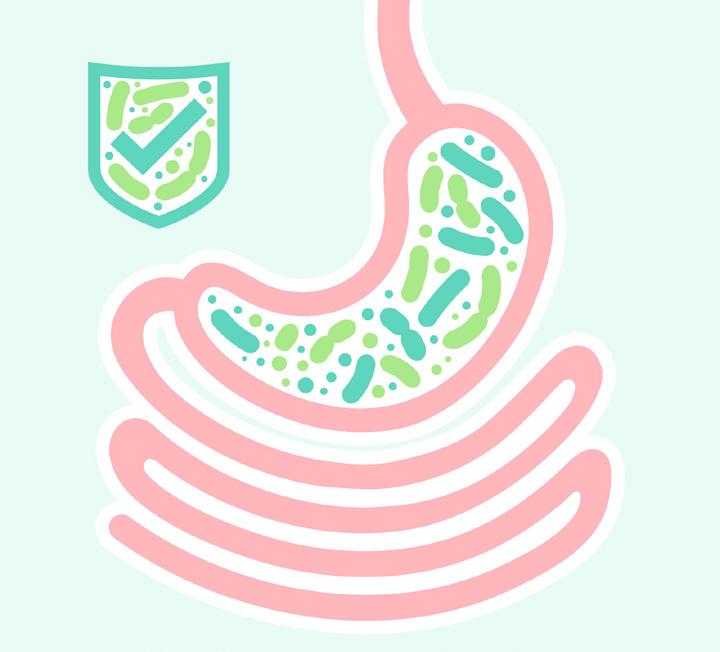
4 minute read
Go with your gut instinct and top up with probiotics
Bacteria are often thought of as sources of disease, but not all of them are bad. In fact, your gut, which is full of trillions of microbes, is dependent on the friendly ones to function well. This is something long recognised by the Fiti Co-op social enterprise that has been helping Tanzanians top up their good bacteria through the sales of homemade probiotic-enhanced yoghurt since 2004. Here’s our guide to good gut health.
Look after your gut and it will look after you.
Most of the time, when it comes to nutrition we like to think in terms of macros and micros (that is macronutrients such as carbohydrates, fats and proteins and micronutrients such as individual vitamins and minerals), but it turns out we should also be taking microbes into account.
Our bodies contain trillions of microbes. In fact, bacteria cells inside us outnumber human cells by about 10 to 1. The most dense microbe population is in your gastrointestinal tract (or gut) where they play a critical role in digestion, immune function and weight regulation.
The majority of these gut bacteria are quite harmless, some are helpful and a small number can cause disease. We each have enough bacteria inside us to fill a soup can and while this may be a rather unsavoury fact, having a large and diverse variety of bacteria inside us is key to our health. The microorganisms work together to break down our food and help us fight infection. Having the right gut bacteria has been linked to weight loss, improved digestion, enhanced immune function, healthier skin and the reduced risk of some diseases. However, having a predominance of unhealthy microbes in the gut may contribute to weight gain, high blood sugar, high cholesterol and other disorders.
The second brain
Our gut microbiome – the name for complex community of microorganisms inside us – does not only have a bearing on our physical health. If you’ve ever “gone with your gut instinct” to make a decision or felt “butterflies in your stomach” when nervous, you’re likely getting signals from your second brain. That is what scientists are now calling the gut because of the enteric nervous system – two thin layers of more than 100 million nerve cells embedded in its walls and which communicates with the brain and can trigger huge emotional shifts. If bad bacteria are running rampant in the stomach and causing indigestion or nausea in the gut, it can send signals to the brain that affect the way you think. Psychological symptoms generated by disturbances in the gut can include depression, anxiety and brain fog.
Are you eating the right foods to help your good gut bacteria?
The food you eat has a large bearing on the diversity and stability of your gut bacteria. It is important to have a varied diet as a healthy gut has a varied community of microbes, each of which prefers different foods.
The emphasis should be on plantbased foods with a variety of whole grains, beans and fruit as they all contain high amounts of fibre, which is the best fuel for your gut bacteria.
Try to limit the amount of highly processed foods you eat. Research has shown that fast food as well as animal-derived fatty foods encourage the development of more harmful bacteria and can suppress good bacteria.
If you have to take antibiotics to treat an infection, remember that this medication will kill good bacteria as well as bad. Once you have completed the course, it is important to make sure you eat lots of foods that boost your microbes afterwards.
It is also beneficial to eat food that is rich in probiotics, a type of friendly bacteria that helps balance the composition of the gut microbiome. Live yoghurt is made from milk that has been fermented by these friendly bacteria.
The benefits of probiotics
While there is much more research needed to be done, early studies suggest probiotics can have health benefits including strengthening your immune system, reducing inflammation, easing skin conditions, reducing the symptoms of depression and even extending our lives.
There are a number of fermented foods that are rich is probiotics such as sauerkraut, kimchi, tempeh and kombucha tea, but one of the simplest and tastiest ways of getting more probiotics into our diet is to eat live yoghurt. As a fermented food, yogurt naturally contains lots of live microbes that not only give its trademark tangy taste, but also bolster the diversity of the gut microbiome.
Tanzanian organisation Fiti Co-op has long recognised the importance of live yoghurt as an affordable, easy-to-eat source of probiotics and how it could be used to help combat pressing health concerns in the country such as malnutrition, diarrhoeal disease and vaginitis, which can increase the risk of contracting HIV.
In 2004, Fiti opened its first kitchen in Mwanza to make yoghurt fortified with the lactobacillus bacteria, a common probiotic, which was donated by Western University as part of its Western Heads East programme to use probiotic foods to contribute to health and sustainable development.
There are now more than 20 of these Fiti community kitchens – Fiti means ‘health’ in Swahili – across 15 states in Tanzania. Kitchen staff are almost exclusively women – they are known as the ‘yoghurt mamas’ – and the project has helped many women become financially independent while contributing to the health of their communities. The kitchens have also become a hub for other services such as lay counselling, disease awareness and social support.
Tanzanians can now order the range of yoghurts and juices through the Fiti app, which can be downloaded for Andriod phones from the Google Play store.
The health benefits of probiotic yoghurt
Information provided by Fiti Co-op






